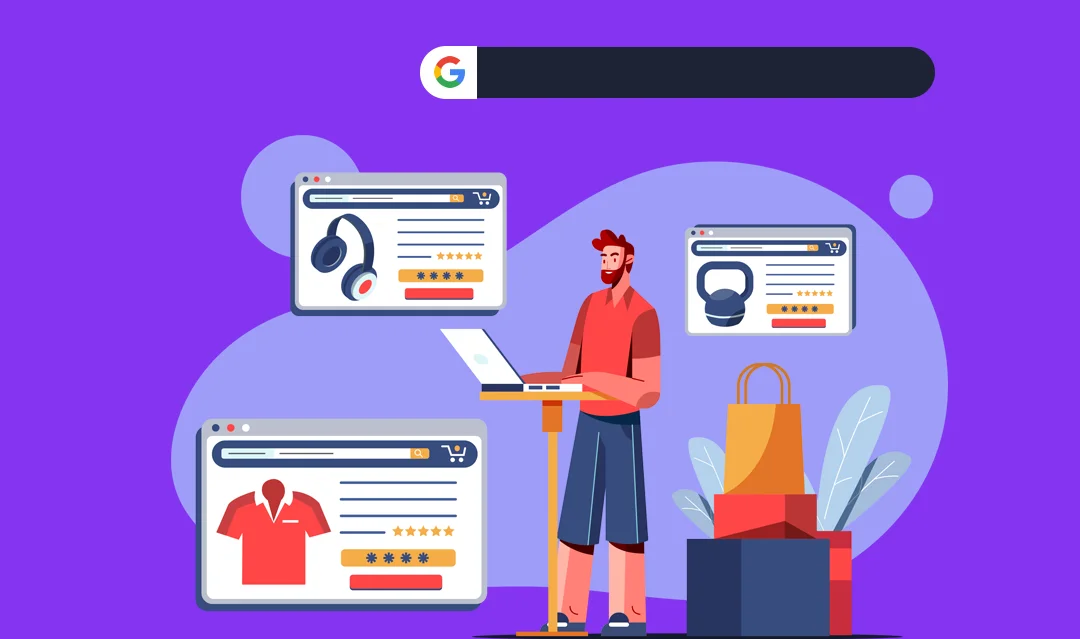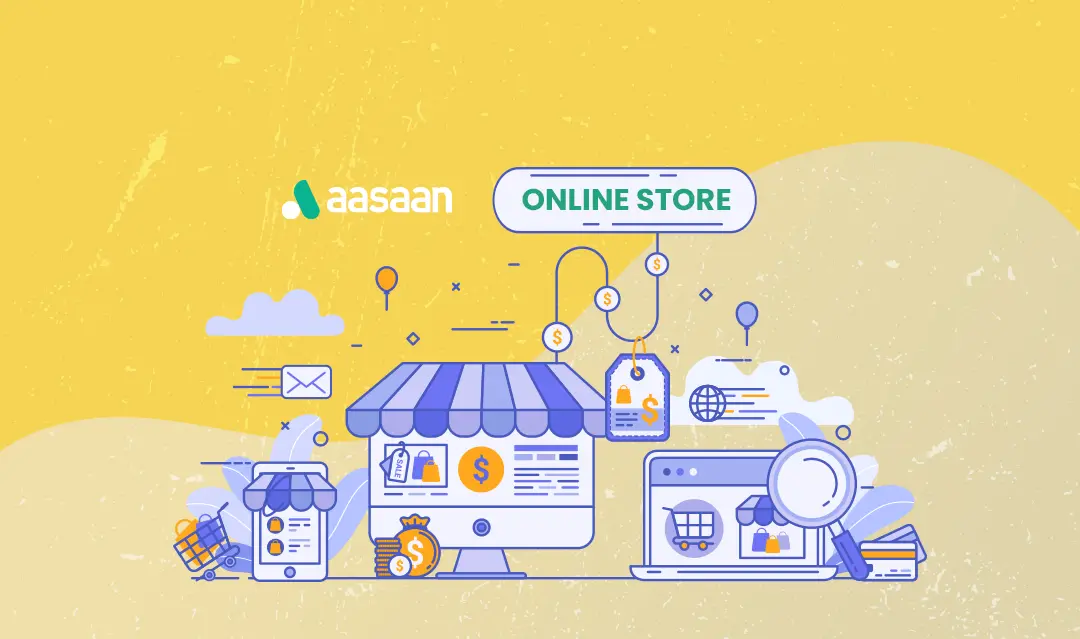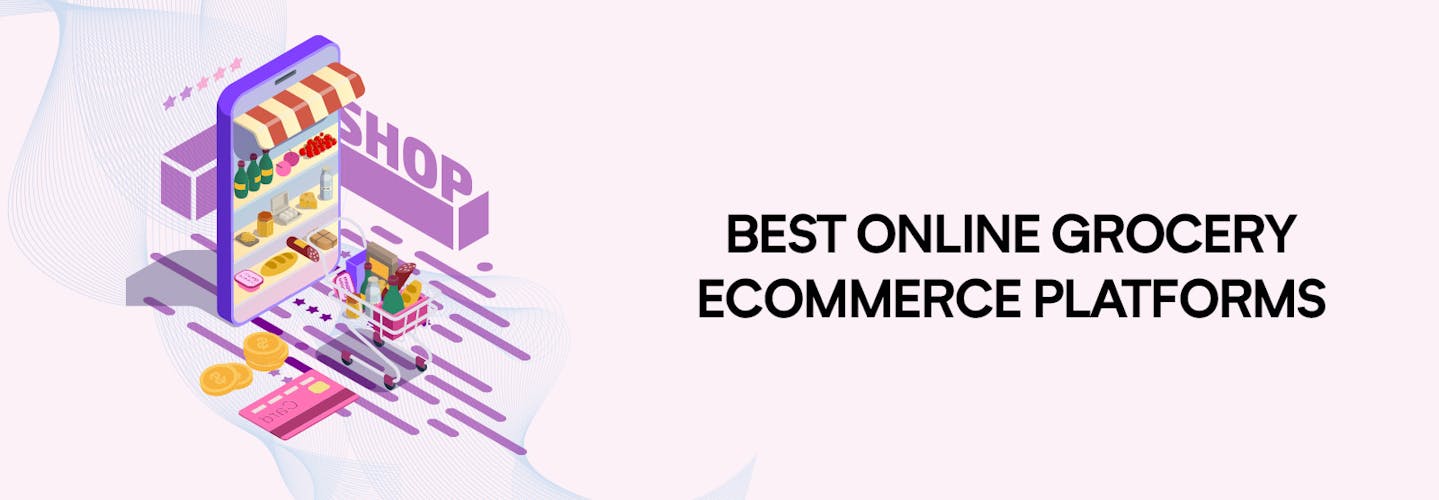
Best Online Grocery Ecommerce Platforms to Build Your Grocery Website
In the digital age, the grocery shopping experience has transformed dramatically.
More and more consumers are turning to online grocery stores for their daily needs.
But why is this the case?
What’s driving this shift from traditional brick-and-mortar stores to online platforms?
Let’s delve into the world of online grocery retailing and uncover the reasons behind its rising popularity.
Is Grocery eCommerce Profitable?
The short answer is yes, grocery eCommerce can be highly profitable.
However, the profitability of an online grocery store depends on several factors, including the store’s location, product range, pricing strategy, and customer service quality.
Online grocery stores have lower overhead costs than physical stores—they don’t need to maintain a physical storefront or pay for utilities.
This allows them to operate at a lower cost and potentially offer more competitive prices.
Moreover, online grocery stores can serve a larger customer base. While a physical store’s customer base is limited by its location, an online store can potentially reach customers across the country—or even internationally.
However, running an online grocery store also comes with its own set of challenges.
These include managing inventory, ensuring timely delivery, and providing excellent customer service.
To be profitable, an online grocery store must effectively address these challenges and meet its customers’ needs.
Why Online Grocery Stores?
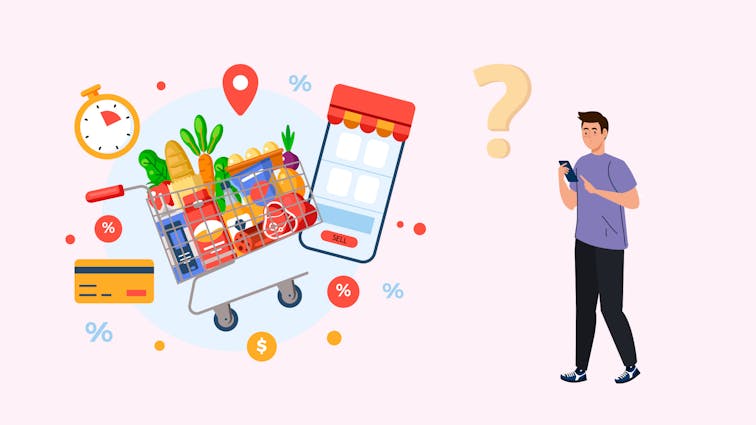
Online grocery stores offer unparalleled convenience and variety. Customers can browse and shop at any time, from anywhere, and have their groceries delivered right to their doorstep.
This convenience is especially valuable in today’s fast-paced world, where time is a precious commodity.
Imagine this: It’s a busy weekday, and you’re juggling work, household chores, and family responsibilities.
The last thing you want to do is spend precious time navigating crowded supermarket aisles. With an online grocery store, you can simply log in, add items to your cart, and check out—all within minutes and without leaving the comfort of your home.
Moreover, online grocery stores often have a wider product range than physical stores. From local produce to international gourmet items, you can find almost anything you need.
This variety, coupled with the convenience of shopping from home, makes online grocery shopping an attractive option for many consumers.
Related: Advantages & Disadvantages of Online Grocery Stores
Choosing the Right Website Builder
When it comes to setting up your online grocery store, choosing the right website builder is crucial.
But what should you look for in a website builder? What features are essential for a successful online grocery store? Let’s explore.
1. User-Friendly Interface
A good website builder should have an intuitive and user-friendly interface. This makes it easy for you to set up and manage your online store, even if you’re not particularly tech-savvy.
Think about it: You want to focus on running your business, not struggling with complicated software.
A website builder with a user-friendly interface allows you to easily add products, set prices, manage orders, and more—giving you more time to focus on what truly matters: serving your customers.
2. Customization Options
Your online grocery store should reflect your brand. Therefore, look for a website builder that offers a wide range of customization options.
This allows you to design your store to match your brand’s aesthetics and values.
For instance, you might want to use your brand’s colors and logo, display featured products on your homepage, or create a unique layout for your product categories.
A website builder with robust customization options can help you create a store that stands out from the competition and resonates with your target audience.
3. SEO Capabilities
Search Engine Optimization (SEO) is crucial for increasing your online visibility.
A website builder with built-in SEO tools can help your store rank higher in search engine results, attracting more potential customers.
Remember, your online store is one among many. To attract customers, you need to be visible where they are searching for products—on search engines like Google.
A website builder with SEO capabilities can help you optimize your product descriptions, meta tags, and other elements to improve your search engine rankings.
4. Mobile Responsiveness
In today’s mobile-first world, it’s essential that your online store is mobile-friendly. A good website builder should automatically optimize your store for mobile devices, ensuring a seamless shopping experience for your customers.
Consider this: More than half of all internet traffic comes from mobile devices. If your online store isn’t optimized for mobile, you could be missing out on a significant number of potential customers.
A mobile-responsive store ensures that customers can easily browse and shop, regardless of the device they’re using.
Related: 8 Best Mobile friendly website builders,
Top Website Builders for Online Grocery Stores
Choosing the right platform for your online grocery store is a critical decision that can make or break your business.
The right website builder should offer the features and flexibility you need to create a user-friendly, attractive, and efficient online store.
Here’s a look at some of the top website builders that are well-suited for online grocery stores.
1. Aasaan App
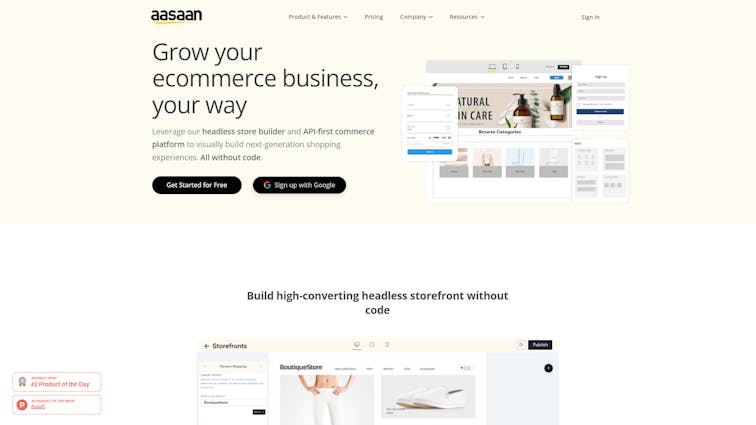
Aasaan App is a specialized platform designed specifically for grocery eCommerce. It offers unique features that cater to the needs of online grocery retailers:
- Drag-and-Drop Builder: Create a unique store design without any technical skills.
- Grocery-Specific Templates: Choose from templates that are designed with grocery stores in mind.
- Integration with Local Delivery Services: Easily connect with local delivery providers to ensure timely delivery of fresh products.
- Mobile Responsiveness: Your store will automatically adapt to different screen sizes, providing a smooth shopping experience.
- Customer Engagement Tools: Engage with your customers through personalized offers, loyalty programs, and more.
Pricing: Aasaan offers Four pricing plans:
- Premium: Priced at $50 per month, this plan is for merchants and startups to help grow their business with branding.
- Business: At $165 per month, this plan is for advanced merchants and includes everything in the Premium plan, plus branded iOS and Android apps, full store access via backend API, webhooks, 5 inventory locations, 10 staff accounts, and unlimited integrations.
- Enterprise: This plan is designed for D2C brands looking for unlimited scalability, greater control, and dedicated resources. It includes everything in the Business plan, plus self-hosted storefronts for high performance, custom storefront themes, custom integrations, and 100% uptime SLA. The pricing for this plan is available upon contacting sales
2. Shopify

Shopify is a renowned eCommerce platform that offers a wide array of features tailored for online retailing. It’s a great choice for online grocery stores, thanks to its:
- User-Friendly Interface: Shopify’s drag-and-drop interface makes it easy to design your store without any coding knowledge.
- SEO Tools: Built-in SEO features help your store rank higher in search engine results.
- Mobile Optimization: Shopify ensures that your store looks great on all devices, including smartphones and tablets.
- Integration with Grocery Delivery Apps: Easily connect with popular grocery delivery services to provide a seamless shopping experience for your customers.
- Customizable Templates: Choose from a variety of professionally designed templates that reflect your brand’s identity.
Pricing: The platform has three primary plans:
- Basic Shopify: $29/month - 2 staff accounts, inventory at up to 4 locations.
- Shopify: $79/month - 5 staff accounts, inventory at up to 5 locations.
- Advanced Shopify: $299/month - 15 staff accounts, inventory at up to 8 locations.
3. Wix
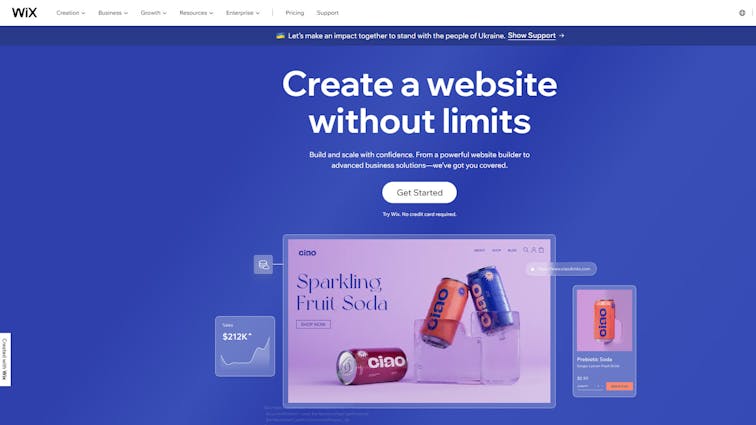
Wix is known for its flexibility and ease of use. It’s a solid choice for online grocery stores, offering:
- Drag-and-Drop Builder: Create a unique store design without any technical skills.
- Wide Range of Apps: Integrate various apps to enhance your store’s functionality, such as online chat support or inventory management.
- Mobile Responsiveness: Your store will automatically adapt to different screen sizes, providing a smooth shopping experience.
- SEO-Friendly: Wix offers SEO tools to help you optimize your site for search engines.
Pricing: Wix offers three e-commerce plans:
- Business Basic: $23/month (if paid annually) - Secure online payments, custom domain, and up to 20GB storage.
- Business Unlimited: $27/month (if paid annually) - Additional features include 35GB storage, professional e-commerce apps, and logo maker.
- Business VIP: $49/month (if paid annually) - Provides priority customer support, 50 GB storage, and unlimited product collections.
4. BigCommerce
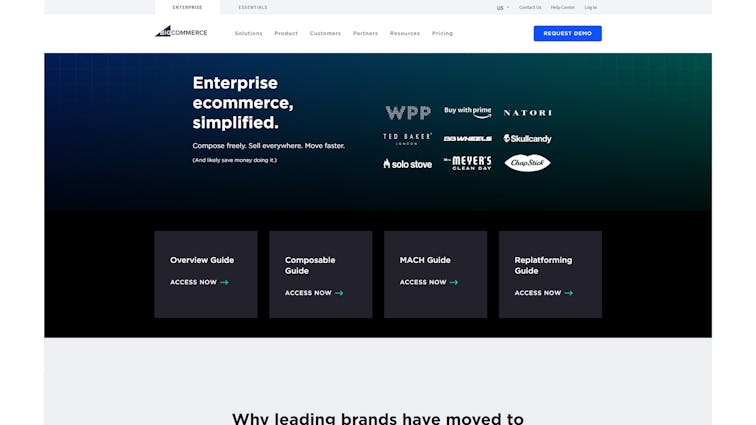
BigCommerce is a powerful platform designed for scalability and growth. It’s an excellent option for online grocery stores that plan to expand, with features like:
- Robust Inventory Management: Easily manage your grocery products, track stock levels, and set up automatic reordering.
- SEO and Marketing Tools: Utilize built-in tools to promote your store and attract more customers.
- Customization: Tailor your store’s appearance and functionality with a wide range of themes and plugins.
- Multi-Channel Selling: Sell your products on various platforms, including social media and marketplaces, all from one dashboard.
Pricing: Like Shopify, BigCommerce offers three plans:
- Standard: $29.95/month (if paid annually) - Best for individuals, annual sales limit of $50,000.
- Plus: $79/month (if paid annually) - Best for small businesses, annual sales limit of $180,000.
- Pro: $299/month (if paid annually) - Best for growing businesses, annual sales limit of $400,000.
- Enterprise Plan: Custom pricing
Step-by-Step Guide to Building Your Online Grocery Store
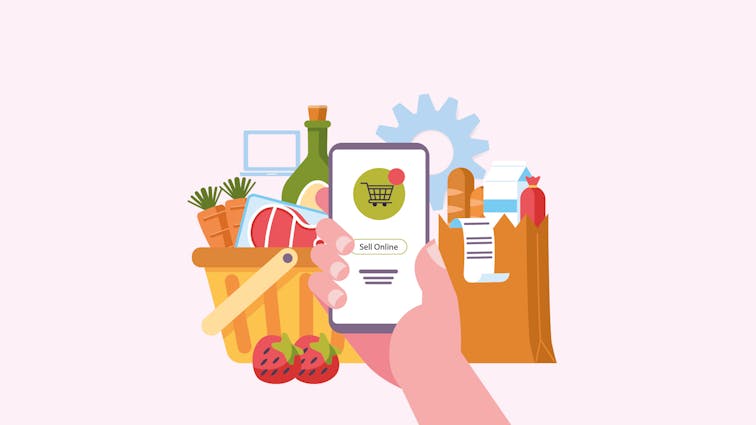
Here’s a step-by-step guide to help you build your online grocery store, along with some essential tips for success.
1. Choose a Platform
Selecting the right website builder is the foundation of your online grocery store. Consider factors like ease of use, customization options, SEO capabilities, and mobile responsiveness.
Platforms like Aasaan, Shopify, Wix, and BigCommerce are popular choices for online grocery stores.
2. Design Your Store
Your store’s design should reflect your brand’s identity and provide a user-friendly shopping experience.
Customize the layout, colors, and branding to create a visually appealing and intuitive interface. Many website builders offer drag-and-drop tools that make this process simple, even if you’re not a tech expert.
3. Add Products
Upload detailed product information, including images, descriptions, and prices. Organize products into categories and subcategories to make browsing easier for customers.
For example, you might have categories like “Fresh Produce,” “Dairy Products,” “Snacks,” and so on.
4. Set Up Payment Gateways
Integrate secure payment methods to facilitate smooth transactions. Most website builders support popular payment gateways like PayPal, Stripe, and credit card payments.
Ensure that the payment process is straightforward and secure to build trust with your customers.
5. Launch
Before going live, test your site thoroughly to identify and fix any issues. Check the functionality of all features, including product search, checkout, and payment processing.
Once everything is in place, launch your site and start welcoming customers!
Tips for Success
1. Provide Excellent Customer Service
Respond to customer queries promptly and provide assistance as needed. Consider offering live chat support or a dedicated helpline.
Excellent customer service can enhance customer satisfaction and encourage repeat business.
2. Offer Discounts and Promotions
Encourage repeat purchases by offering discounts, loyalty programs, and special promotions.
For example, you might offer a discount on the first purchase or free delivery for orders over a certain amount.
3. Optimize for Mobile
Ensure that your online store provides a seamless shopping experience on all devices, including smartphones and tablets.
A mobile-responsive design ensures that customers can easily browse and shop, regardless of the device they’re using.
Marketing Your Online Grocery Store
1. SEO Strategies
Optimizing your site for search engines is crucial for increasing visibility and attracting more customers.
Implement SEO best practices, such as using relevant keywords (including LSI & secondary keywords like “online grocery delivery” and “grocery eCommerce platform”), creating high-quality content, and building backlinks.
2. Social Media Marketing
Engage with customers on social media platforms like Facebook and Instagram. Share updates, promotions, and engaging content to build a community around your brand.
Social media marketing allows you to connect with customers on a personal level and encourage them to share their experiences with others.
Conclusion
Building an online grocery store is a multifaceted process that requires careful planning and execution.
By choosing the right platform, designing an appealing store, adding products, setting up payment gateways, and implementing effective marketing strategies, you can create a thriving online grocery business.
Remember, the key to success lies in understanding your customers’ needs and providing an exceptional shopping experience.
With the right approach and tools, you can build an online grocery store that stands out in the competitive market.
Ready to start your online grocery journey? Book a consultation with us today, and let’s create an online store that resonates with your customers and drives success.
FQA’s:
1. What is a Mini Grocery Store?
A mini grocery store is a small-scale retail store that offers a limited selection of grocery items. Unlike large supermarkets, mini grocery stores typically focus on essential products and may cater to the immediate needs of a local community. They are often found in urban areas or neighborhoods where space is limited, and they provide a convenient shopping option for everyday essentials.
2. Are Grocery Stores Profitable?
Yes, grocery stores can be profitable, but profitability depends on various factors such as location, competition, product selection, pricing strategy, and customer service. Online grocery stores may have lower overhead costs, allowing for potentially higher profit margins. Mini grocery stores, with their focus on essential items and local clientele, can also be profitable if managed effectively. However, the grocery retail industry is known for its thin margins, so careful management and strategic planning are essential for success.
3. How Do I Start an Online Grocery Store?
Starting an online grocery store involves several key steps:
- Choose a Platform: Select a website builder that suits your needs, such as Shopify or Wix.
- Design Your Store: Customize the layout and branding to reflect your business identity.
- Add Products: Upload detailed product information, including images and prices.
- Set Up Payment Gateways: Integrate secure payment methods for smooth transactions.
- Launch: Test your site thoroughly before going live to ensure a seamless customer experience.
4. What Are the Benefits of Shopping at an Online Grocery Store?
Shopping at an online grocery store offers several benefits, including:
- Convenience: Customers can shop at any time and from anywhere.
- Variety: Online stores often have a wider product range compared to physical stores.
- Time-Saving: Avoid the need to travel and wait in lines.
- Personalized Experience: Many online stores offer personalized recommendations and promotions.
5. How Can I Make My Online Grocery Store Successful?
Making an online grocery store successful requires:
- Understanding Your Customers: Know their needs and preferences.
- Providing Excellent Customer Service: Respond promptly to queries and provide assistance.
- Offering Discounts and Promotions: Encourage repeat business.
- Optimizing for Mobile: Ensure a seamless shopping experience across devices.
- Implementing Effective Marketing Strategies: Utilize SEO and social media marketing to increase visibility.
6. What Should I Consider When Choosing a Website Builder for My Online Grocery Store?
When choosing a website builder for your online grocery store, consider factors such as:
- Ease of Use: Look for user-friendly interfaces.
- Customization Options: Ensure the platform allows you to design your store according to your brand.
- SEO Capabilities: Choose a builder with built-in SEO tools to increase online visibility.
- Mobile Responsiveness: Ensure the platform automatically optimizes your store for mobile devices.
By understanding these aspects of online and mini grocery stores, you can make informed decisions whether you’re a consumer looking for convenient shopping options or an entrepreneur seeking to enter the grocery retail industry.



